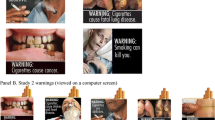Abstract
To assess whether Health Risk Appraisal (HRA), a computer-scored lifestyle analysis questionnaire, can result in significant changes in health behavior, a controlled clinical trial with one-year follow-up was conducted among entering freshmen at an urban state university. Three hundred fifty entering freshmen were each assigned to one of four groups: HRA with feedback, HRA without feedback, initial control, and final control. Twenty-two per cent of the nonsmokers in the no-feedback group, as compared with 5% in the feedback group, acquired the habit of cigarette smoking (p<0.001). Furthermore, 26% of the smokers in the feedback group, as compared with 6% in the no-feedback group, were able to quit smoking (p<0.05). Among those unable to quit smoking, 59% in the feedback group, as compared with 19% in the no-feedback group, were able to reduce their cigarette consumption by more than six cigarettes per day (p<0.01). Health Risk Appraisal, when accompanied by feedback counseling, was an effective health promotion tool to help prevent nonsmokers from acquiring the habit and to modify cigarette smoking behavior among college freshmen.
Similar content being viewed by others
References
Anonymous. Health risk appraisal—United States. MMWR 1981; 30:133–5.
Goetz AA, Duff JF, Bernstein JE. Health risk appraisal: the estimation of risk. Public Health Rep 1980; 95:119–26.
Ellis LBM, Raines JR. Health risk appraisal: a tool for health education. Health Education (Wash) 1983; 14:30–4.
Wagner EH, Beery WL, Schoenbach VJ, Graham RM. An assessment of health hazard/health risk appraisal. Am J Public Health 1982; 72:347–52.
Bartlett EE, Pegues HU 2d, Shaffer Cr, Crump W. Health hazard appraisal in a family practice center: an exploratory study. J Community Health 1983; 9:135–44.
Chenoweth DH. Health risk appraisal at the college level. J An Coll Health Assoc 1981; 29:174–7.
Curtin B. Health hazard appraisal: a tool for health maintenance. J Ambulatory Care Manage 1981; 4:65–72.
Rodnick JE. Health behavior changes associated with health hazard appraisal counseling in an occupational setting. Prev Med 1982; 11:583–94.
Wilson RW, Wingender MK, Redican KJ, Hettler W. Effects of the Health Hazard Appraisal Inventory on practices of college students. Health Educ (Wash) 1980; 11:28–30.
Black GC, Ashton AL Jr. Health risk appraisal in primary care. Primary Care 1985; 12:557–71.
Wallston KA, Wallston BS, DeVellis R. Development of the Multidimensional Health Locus of Control (MHLC) Scales. Health Educ Monogr 1978; 6:160–70.
MacMahon B. Epidemiology: principles and methods. Boston: Little, Brown, 1970.
Armitage P. Statistical methods in medical research. Oxford: Blackwell Scientific Publications, 1971.
Author information
Authors and Affiliations
Additional information
Supported by a grant from Metropolitan Foundation, New York, NY.
Rights and permissions
About this article
Cite this article
Chan, CW., Witherspoon, J.M. Health risk appraisal modifies cigarette smoking behavior among college students. J Gen Intern Med 3, 555–559 (1988). https://doi.org/10.1007/BF02596099
Issue Date:
DOI: https://doi.org/10.1007/BF02596099




